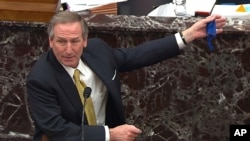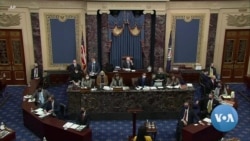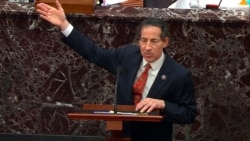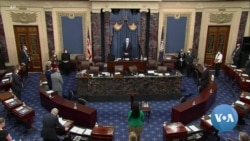U.S. senators are expected to hear final arguments in the impeachment trial of former President Donald Trump on Saturday, after lawyers for Trump wrapped up their presentation Friday, denying he helped incite a deadly mob attack on the U.S. Capitol and arguing the trial is a politically inspired and illegal “witch hunt.”
Lawyers for Trump made their case in three hours Friday, choosing not to use the full 16 hours allocated.
“The article of impeachment now before the Senate is an unjust and blatantly unconstitutional act of political vengeance,” Trump attorney Michael van der Veen argued.
“Like every other politically motivated witch hunt the left has engaged in over the past four years, this impeachment is completely divorced from the facts, the evidence and the interests of the American people,” van der Veen added.
Trump’s attorneys told senators that the former president had every right to dispute his election loss to President Joe Biden and that Trump’s 70-minute speech just minutes before the January 6 insurrection at the U.S. Capitol did not amount to inciting the violence.
When Trump urged thousands of supporters on the Ellipse to “fight like hell,” the defense said it was no different from Democrats’ use of similar rhetoric that could spark violence.
“This is ordinary political rhetoric that is virtually indistinguishable from the language that has been used by people across the political spectrum for hundreds of years,” van der Veen said.
Trump’s lawyers played a lengthy video montage featuring prominent Democrats, including Vice President Kamala Harris, Senatpr Elizabeth Warren and Senate Democratic leader Chuck Schumer, using the word “fight” without any context.
Also featured in the video were many of the Democratic lawmakers who are the impeachment managers prosecuting the former president.
After the defense’s presentation Friday, the senators held a question-and-answer session, taking turns submitting written questions to both the lawyers for Trump and the Democratic lawmakers prosecuting the former president.
One of the first questions came from Republican Senators Susan Collins of Maine and Lisa Murkowski of Alaska, who have both been critical of Trump’s actions, asking exactly when Trump learned of the breach of the Capitol and what specific actions he took.
Van der Veen did not directly answer the question but blamed Democrats for not investigating the matter.
The lead impeachment manager, Representative Jamie Raskin of Maryland, said later in the session that the details being sought are “in sole possession of the president” and noted that Trump was invited to participate in the trial but declined.
Vermont Senator Bernie Sanders, an independent who often votes with the Democrats, asked if Trump’s lawyers believed Trump’s claim that he won the 2020 election. Van der Veen objected to the question, saying, "My judgment is irrelevant in these proceedings.”
"What's relevant in this impeachment article is: Were Mr. Trump's words inciteful to the point of violence and riot?” van der Veen said, arguing that they were not.
The impeachment trial reconvenes at 10 a.m. Saturday. Neither the House managers nor lawyers for Trump have so far announced any plans to call witnesses in the trial, which means the two sides will likely make their final arguments Saturday, with a vote from senators to soon follow.
Friday’s question-and-answer session and defense presentation followed a two-day presentation by House Democrats linking Trump’s rhetoric at a rally on January 6 to the actions of the mob that stormed the U.S. Capitol shortly afterward in an attempt to block the certification of the 2020 presidential election results.
Impeachment prosecutors contended Thursday there is “clear and overwhelming” evidence that Trump incited insurrection by sending a mob of his supporters to the Capitol to confront lawmakers as they were certifying that he had lost the November election to Democrat Joe Biden.
In wrapping up his presentation, lead impeachment manager Raskin told the 100 members of the Senate acting as jurors they should use “common sense on what happened here.”
“It is a bedrock principle that no one can incite a riot” in the American democracy, Raskin said.
But he argued that Trump urged hundreds of his supporters to march to the Capitol on January 6 and then, when they stormed the building, smashed windows, ransacked offices and scuffled with police, “did nothing for at least two hours” to end the mayhem that left five people dead, including a Capitol Police officer.
“He betrayed us,” Raskin said of the former U.S. leader, whose four-year term ended January 20 as Biden was inaugurated as the country’s 46th president. “He incited a violent insurrection against our government. He must be convicted.”
Raskin and eight other impeachment managers, all Democrats in the House of Representatives, concluded their case after about 12 hours spread over two days of presenting arguments and evidence against Trump.
They flashed dozens of Trump’s Twitter comments on television screens in the Senate chamber from the weeks leading up to the election, with his claims that the only way he could lose to Biden was if the election was rigged, then more tweets with an array of his unfounded claims after the election that he had been cheated out of another term in the White House.
The House impeachment managers also showed an array of video clips of the rioters raging through the Capitol complex, most graphically scenes of some of them shouting “Hang Mike Pence!” as they searched in vain for Trump’s vice president, who had refused to accede to Trump’s demands to block certification of Biden’s victory.
Trump’s lawyers have broadly claimed that Trump’s speech at the rally shortly before the rampage at the Capitol in which he urged his supporters to “fight like hell” was permissible political rhetoric, sanctioned by the U.S. Constitution’s First Amendment protection of freedom of speech.
But Raskin told the Senate, “What is impeachable conduct if not this? If you don’t find [that Trump committed] high crimes and misdemeanors [the standard for conviction of an impeachment charge], you have set a new, terrible standard for presidential conduct.”
Thursday’s session came after several lawmakers told reporters they were shaken by graphic, previously undisclosed videos of the mayhem the Democratic lawmakers showed them Wednesday, with scenes of dozens of officials scrambling to escape the mob that had stormed into the Capitol.
But there was no immediate indication that Republican supporters of Trump in the Senate were turning en masse against him. Trump remains on track to be acquitted.
A two-thirds vote is needed to convict Trump of a single impeachment charge, that he incited insurrection by urging hundreds of supporters to confront lawmakers at the Capitol to try to upend Biden’s victory. In the politically divided 100-member Senate, 17 Republicans would have to join every Democrat for a conviction.
As of late Friday, it appeared that only a handful of Republicans might vote to convict Trump, the only president in U.S. history to be twice impeached.
The Senate voted 56-44 on Tuesday to move ahead with the trial, rejecting Trump’s claim that it was unconstitutional to try him on impeachment charges since he had already left office. The vote also seemed to signal that relatively few Republicans appeared willing to convict him.
Trump left Washington hours ahead of Biden’s inauguration January 20 and is living at his Florida mansion.











